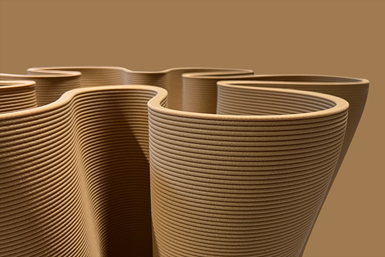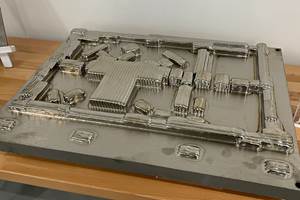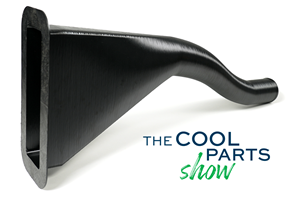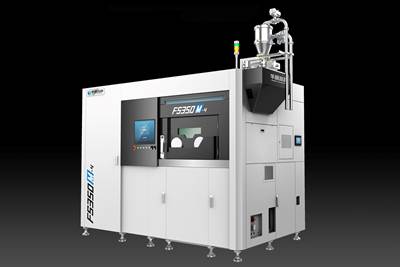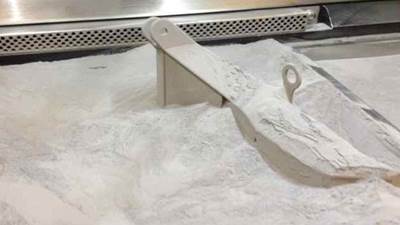3D Printer Manufacturer Now Offers Bio-Based, Recyclable Printing Materials
This collaboration gives customers a highly efficient process that eliminates production waste, minimizes energy consumption and enables flexible, localized, on-demand production with a smaller environmental footprint.
The Industry, a Finnish manufacturer of large-scale 3D printers, is now offering the patented bio-based and recyclable Sulapac materials for its customers. This partnership is said to empower businesses to make a positive impact on the environment while boosting efficiency and exceeding customer expectations.
The collaboration between the Helsinki-based material innovation company Sulapac and the Swedish 3D printing expert The Industry opens up new avenues for circular economy and climate action. It brings together cutting-edge expertise in biomaterial development and industrial engineering with shared values of innovation, sustainability and quality.
Manufacturing with The Industry’s next-generation 3D printers is a highly efficient process that eliminates production waste, minimizes energy consumption and enables flexible, localized, on-demand production. Choosing sustainable Sulapac as the printing material over conventional plastic lowers customers’ environmental footprint even further.
Made of biodegradable biopolymers and sustainable fillers such as wood from industrial sidestreams, Sulapac materials have a low carbon footprint. They are safe for people and the planet throughout the life cycle with zero persistent microplastics or toxic substances left behind. Also, Sulapac materials are recyclable by design and can be made with recycled content.
In addition to requirements for environmental responsibility, the materials selected for The Industry’s material library must fulfill strictly defined technical criteria. Sulapac Flow 1.7, a beautiful wood- composite, and Sulapac Universal Heat 30, a bio-based material with good heat endurance and ability to stand high pressure, have performed extremely well in comprehensive testing conducted by The Industry, both in terms of mechanical properties and processability.
“We are very proud of our partnership with Sulapac due to the exceptional quality of their materials and their seamless compatibility with our MAGNUM printer,” says Jonas Carlsson, CEO of The Industry Sweden. “As we always strive to give the best to our customers. We truly believe that materials like Sulapac will have a strong positive impact on sustainable global production.
“In our experience, modern businesses are constantly searching for new materials that can convey a premium look and feel,” Carlsson adds. “After running multiple tests on our MAGNUM printer, we can say without a doubt that Sulapac managed to live up to the expectations and we can only foresee a positive increase in demand for their materials across various industries working with additive manufacturing technologies.”
Sulapac Flow 1.7 and Universal Heat 30, both food-contact compliant and industrially compostable certified, are now among the recommended feedstock materials for MAGNUM printers, The
Industry’s spearhead product. Companies can also order products printed from Sulapac.
Sulapac can be used in 3D printed furniture, prototypes, machine parts and design items, and more. Sulapac Universal Heat finds additional applications, including industrial molds for die casting, cement casting, die molding and pressure molding.
“Thanks to the cooperation with The Industry, we have started to discover the variety of possibilities for Sulapac materials in 3D printing,” says Emmi Randell, Sulapac head of business development. “Their technical fit and unparalleled sustainability features combined with the many benefits of 3D printing offer endless opportunities for companies willing to lead the way towards a cleaner future.”
Related Content
BMW Group Vehicle to Adopt 3D Printed Center Console
A vehicle coming to market in 2027 will include a center console carrier manufactured through polymer robot-based large-format additive manufacturing (LFAM).
Read MoreHow Norsk Titanium Is Scaling Up AM Production — and Employment — in New York State
New opportunities for part production via the company’s forging-like additive process are coming from the aerospace industry as well as a different sector, the semiconductor industry.
Read MoreVideo: Construction 3D Printing with Robotics, Geopolymer
Alquist 3D is aiming to revolutionize construction and infrastructure with large-format robotic 3D printing using a carbon-neutral material.
Read MoreAircraft Ducts 3D Printed in Composite Instead of Metal: The Cool Parts Show #68
Eaton’s new reinforced PEKK, tailored to aircraft applications, provides a cheaper and faster way to make ducts compared to formed aluminum.
Read MoreRead Next
Bike Manufacturer Uses Additive Manufacturing to Create Lighter, More Complex, Customized Parts
Titanium bike frame manufacturer Hanglun Technology mixes precision casting with 3D printing to create bikes that offer increased speed and reduced turbulence during long-distance rides, offering a smoother, faster and more efficient cycling experience.
Read MorePostprocessing Steps and Costs for Metal 3D Printing
When your metal part is done 3D printing, you just pull it out of the machine and start using it, right? Not exactly.
Read MoreCrushable Lattices: The Lightweight Structures That Will Protect an Interplanetary Payload
NASA uses laser powder bed fusion plus chemical etching to create the lattice forms engineered to keep Mars rocks safe during a crash landing on Earth.
Read More




